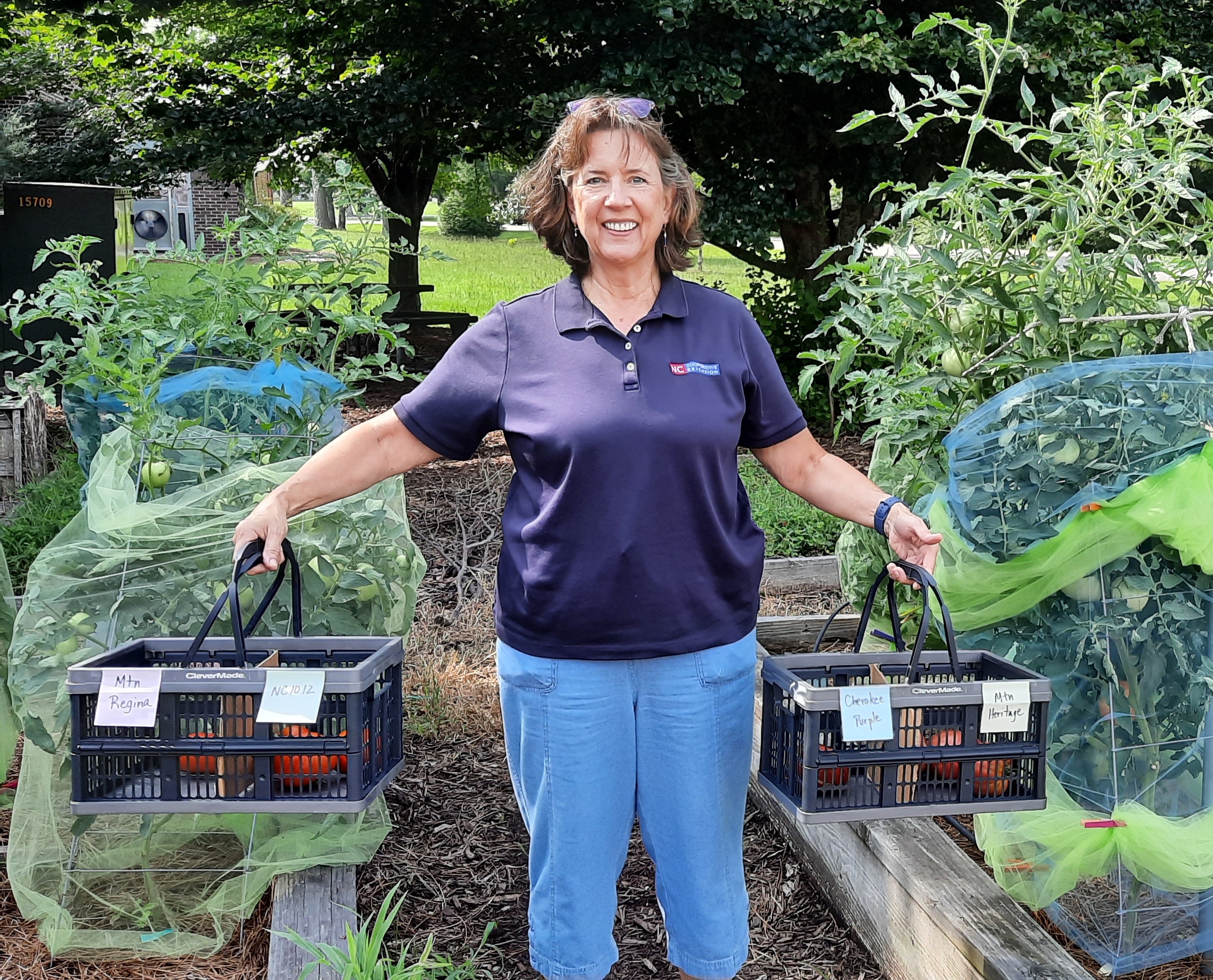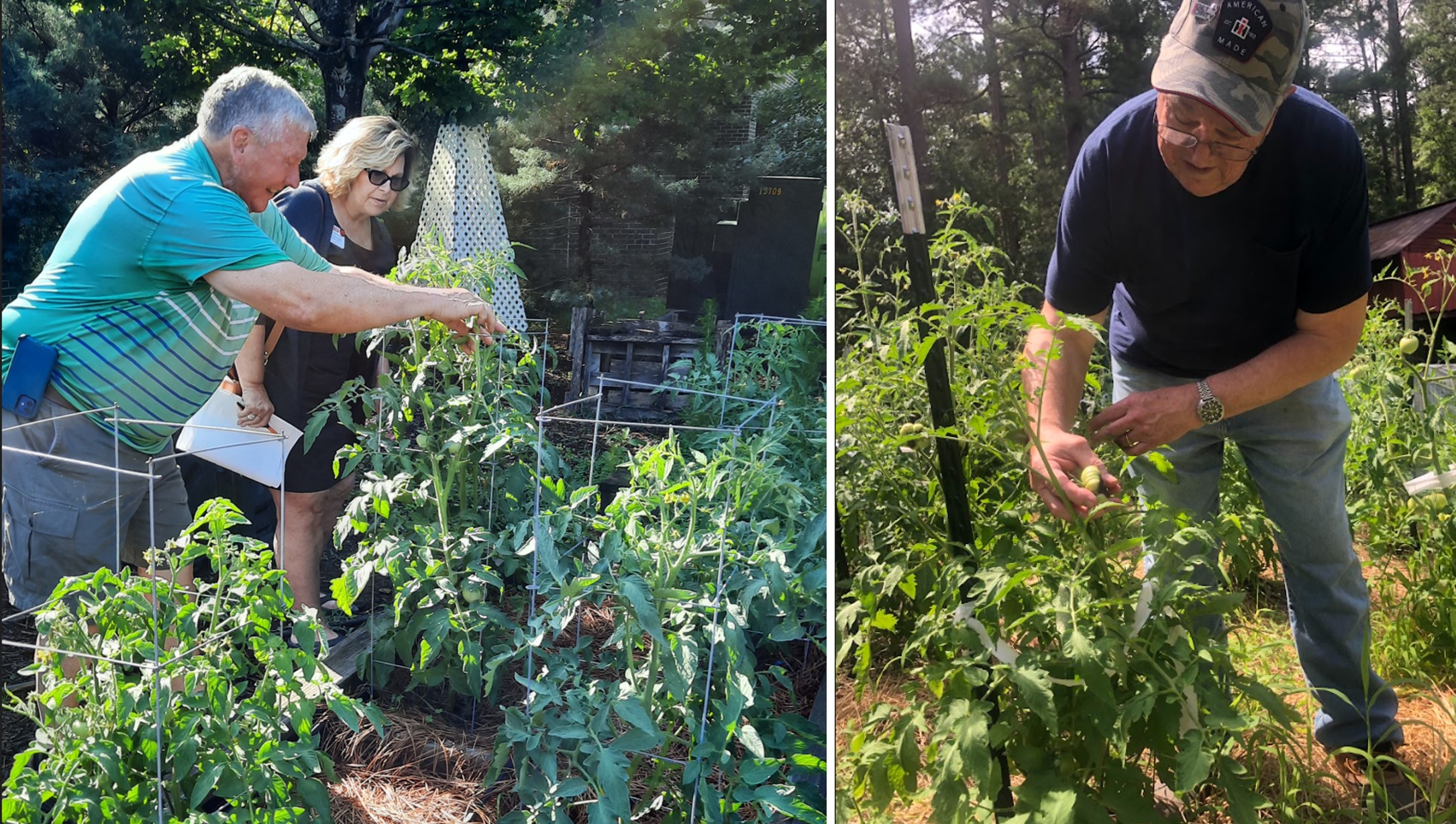Extension Volunteers Trial NC State Disease-Resistant Tomato Varieties
go.ncsu.edu/readext?960835
en Español / em Português
El inglés es el idioma de control de esta página. En la medida en que haya algún conflicto entre la traducción al inglés y la traducción, el inglés prevalece.
Al hacer clic en el enlace de traducción se activa un servicio de traducción gratuito para convertir la página al español. Al igual que con cualquier traducción por Internet, la conversión no es sensible al contexto y puede que no traduzca el texto en su significado original. NC State Extension no garantiza la exactitud del texto traducido. Por favor, tenga en cuenta que algunas aplicaciones y/o servicios pueden no funcionar como se espera cuando se traducen.
Português
Inglês é o idioma de controle desta página. Na medida que haja algum conflito entre o texto original em Inglês e a tradução, o Inglês prevalece.
Ao clicar no link de tradução, um serviço gratuito de tradução será ativado para converter a página para o Português. Como em qualquer tradução pela internet, a conversão não é sensivel ao contexto e pode não ocorrer a tradução para o significado orginal. O serviço de Extensão da Carolina do Norte (NC State Extension) não garante a exatidão do texto traduzido. Por favor, observe que algumas funções ou serviços podem não funcionar como esperado após a tradução.
English
English is the controlling language of this page. To the extent there is any conflict between the English text and the translation, English controls.
Clicking on the translation link activates a free translation service to convert the page to Spanish. As with any Internet translation, the conversion is not context-sensitive and may not translate the text to its original meaning. NC State Extension does not guarantee the accuracy of the translated text. Please note that some applications and/or services may not function as expected when translated.
Collapse ▲
Local EMG program coordinator Krys Ochota shows off the first harvest from the test plot at the N.C. Cooperative Extension, Brunswick County Center.
Tomatoes are one of our most popular vegetables and the pride of many gardeners’ summer vegetable patch. As many of us have discovered, pests and diseases can make growing a bountiful tomato crop in North Carolina challenging. To help identify tomato varieties that are less problem-prone, NC State Extension Master Gardener℠ volunteers are trialing three new disease-resistant varieties developed by NC State plant breeders.
The tomato varieties under evaluation were bred and selected by NC State Fresh Market Tomato Breeding Program team members Dilip Panthee, Reza Shekasteband, and Randolph Gardener. They are:
- ‘Mountain Regina’ – A variety with an indeterminate growth habit that bears large, red fruit.
- ‘Mountain Heritage’ – Another indeterminate variety that produces large, pink fruit similar in shape to those borne by ‘Cherokee Purple.’
- ‘NC1012’ – A determinate variety with large red fruit.
Also included in the trial is ‘Cherokee Purple,’ an heirloom variety with indeterminate growth and large, purple fruit. As with many heirloom varieties, ‘Cherokee Purple’ has little disease resistance and is grown mainly for its superior flavor. The performance and taste of the new disease-resistant varieties will be compared to this long-time favorite.
The trial, which evaluates varieties based on yield, harvest window, pest and disease tolerance, taste, and appearance, was designed by Matt Jones, N.C. Cooperative Extension horticulture agent in Chatham County, and Inga Meadows, NC State Extension Specialist for vegetable and herbaceous ornamental plant pathology. The ultimate goal is to determine which varieties are the tastiest, most productive, and best suited for growing in home and community gardens.

Master Gardener volunteer interns Ronnie Abbott and Jen Williams monitor tomato plants for disease symptoms at the Brunswick County Center (left). Rob Bergmueller, Master Gardener volunteer in Chatham County, inspects a developing fruit (right).
A successful pilot held this summer evaluated the trial protocols and procedures. The pilot engaged Extension Master Gardener volunteers in Chatham and Brunswick County, who grew the varieties in test plots at their local Extension center or in their own yards.
Thanks to funding provided by NC State Extension administration through the Horticulture Working Groups, the trial will expand next year to include more sites and involve volunteers in additional counties. Following the 2024 growing season, Extension experts will analyze the data and determine which varieties were considered the tastiest and best performers. Stay tuned for recommendations!
Extension Master Gardener volunteers work with Extension professionals across North Carolina to grow knowledge and promote sustainable gardening practices by
- participating in citizen science and research projects,
- providing research-based information,
- and offering educational programming and community outreach.
Other research projects they have participated in include a basil variety trial and an ongoing project investigating how to improve pollinator habitat in residential landscapes.
Learn more about how you can support or be part of the NC State Extension Master Gardener program!



